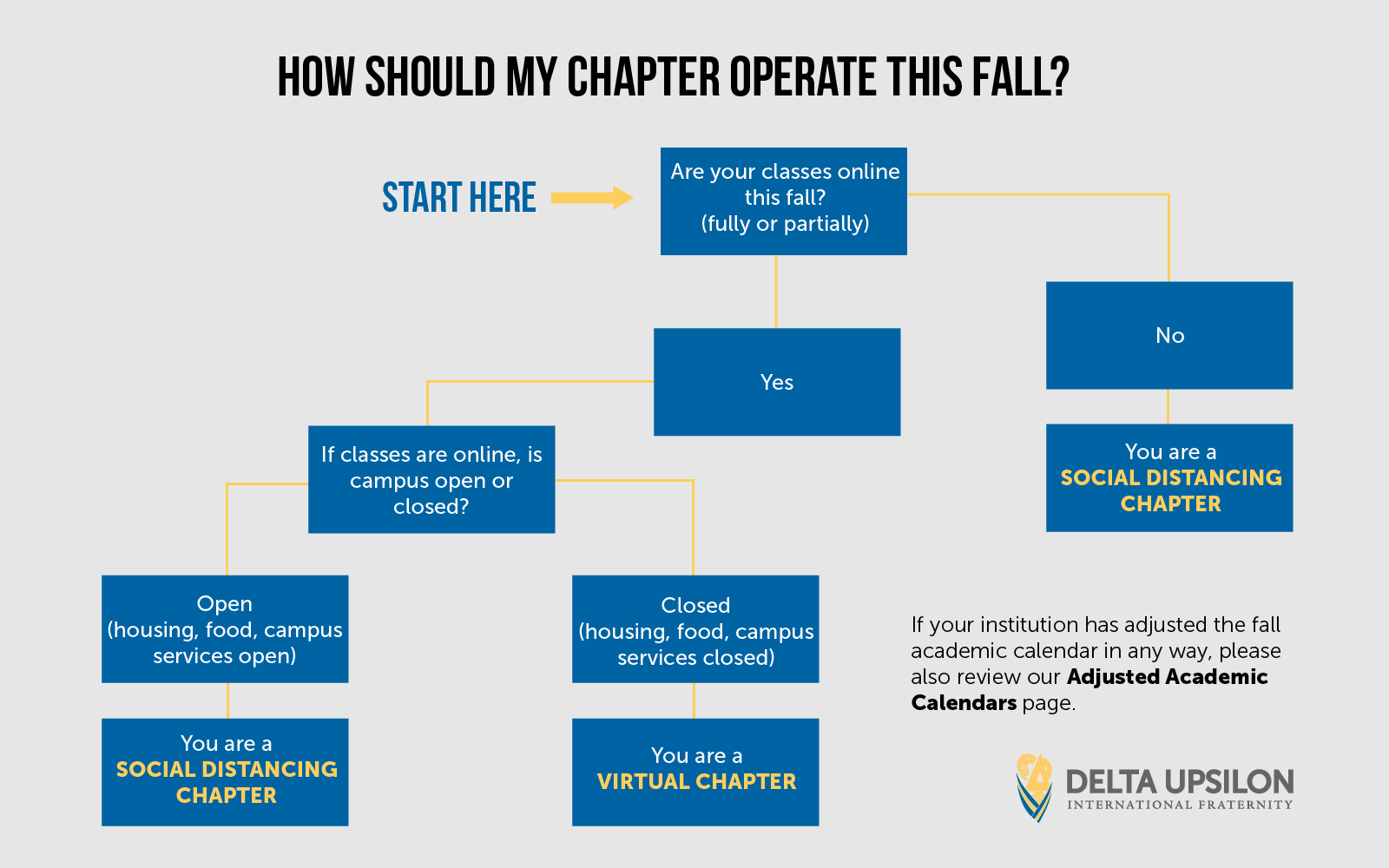COVID 19: Brotherhood Amid Pandemic
In what felt like the blink of an eye, this spring, our world stopped on a dime. In March 2020, COVID-19 became a global pandemic and halted much of our day-to-day existence. Around the globe, schools and businesses closed. We were asked to limit our travel and figure out how to learn and work from home. We learned the term “social distancing.” Things began to be labeled as essential and non-essential.
One thing that is definitely essential: brotherhood.
As a Fraternity, COVID-19 has brought both challenges and opportunity. Operationally, our chapters/colonies and the International Fraternity have been forced to quickly figure out how to create a virtual and socially distanced brotherhood. We have had to reimagine our programming. In the process, creativity has soared, and we have been reminded of how much our brothers mean to us. We have discovered new ways to stay connected, support one another and deliver important programming. The changes DU has been forced to make will continue to usher in a new wave of innovation, much of which will remain long after the pandemic ends.
This is not the first time the world, or even Delta Upsilon, has been impacted by such a large-scale, global event. We have endured wars and other outbreaks. In 1918, for example, we dealt with both at the same time. But by working together and focusing one another’s needs, DU came out of World War I and the influenza pandemic strong. That is exactly what will happen now.
While there is still much we do not know about COVID-19 and its long-term effects as we head into fall 2020, it is important to look at how far we have already come. In this issue of the DU Quarterly, we will discuss how the Fraternity has persevered through the pandemic so far, our plans for the future, and how individual brothers have made an impact on their communities.
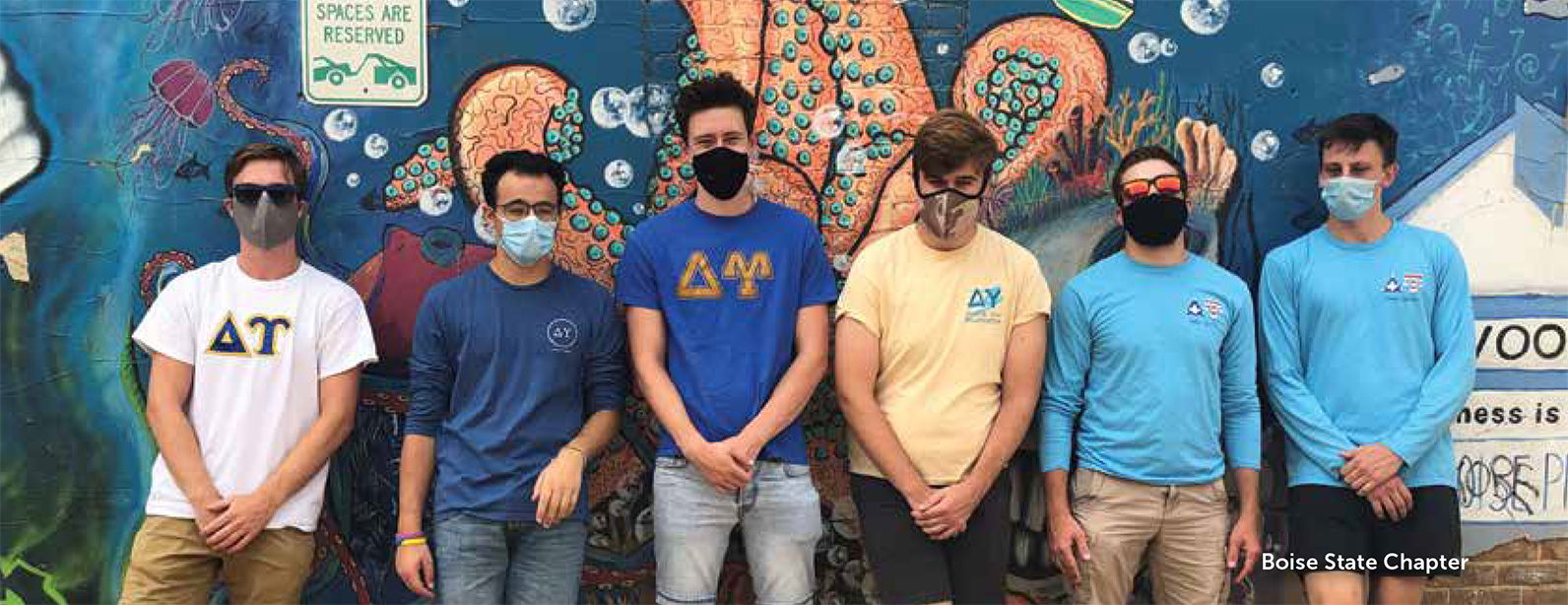
Delta Upsilon and COVID-19
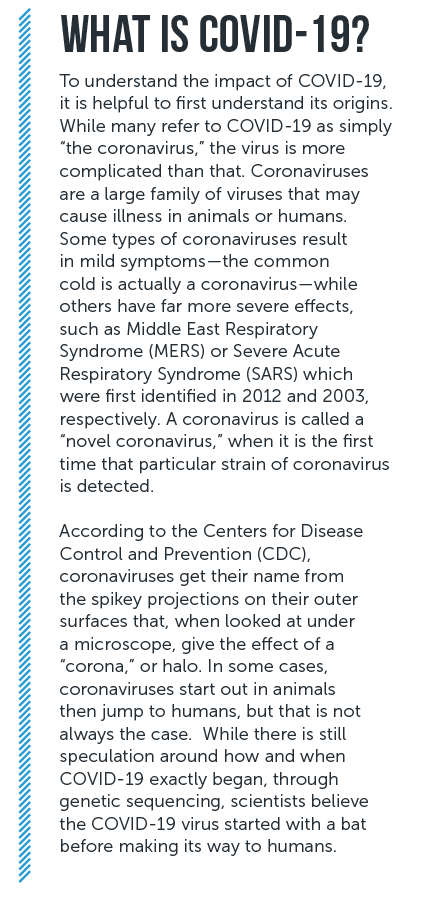
On Monday, March 9, the International Fraternity sent its first mass communication to chapters and volunteers regarding COVID-19. At this point, DU’s partner campuses were still open, and the Fraternity looked to provide basic information about the virus and guidance on what to do should a member become sick. Just two days later, 21 of DU’s 69 chapters/colonies had learned of their campus’ decision to move to remote learning. With these decisions came a flood of questions about whether brothers should remain in chapter houses, if chapter events could continue and more. Within a week, all 69 of DU’s chapters/colonies were faced with remote learning.
During this time, Fraternity staff worked diligently to reach out to chapter leadership and advisors from every chapter/colony to learn what was happening on their campus. While all campuses eventually moved to a fully virtual experience for the remainder of the spring, in early to mid-March, many campuses had announced just temporary online learning periods with plans to re-evaluate at a later date. At the crux of the Fraternity’s recommendations was that each chapter/colony follow the recommendations of their campus, local government and state/province.
“The Fraternity has really relied on our brothers and partners on the ground in each of our campus communities to drive our COVID-19 response,” said Delta Upsilon Executive Director Justin Kirk, Boise State ’00. “Each situation has been so nuanced. From our members to our advisors, house corporation volunteers and campus partners, maintaining open communication and partnership helped guide us through the spring and summer.”
Adjustments at the Chapter Level
In addition to adjusting to virtual classes, DU chapters/colonies were left looking for ways to move the Delta Upsilon experience online. Just because brothers were asked to leave campus did not mean the DU experience should end for the school year. Operationally, chapters/colonies were encouraged to continue hosting Executive Board and advisor meetings online, as well as full chapter meetings. In terms of building brotherhood and supporting one another, chapters/colonies also turned to video call hangouts, Netflix watch parties, online gaming sites and more to maintain connection.
In the Embry-Riddle Chapter, for example, continuing to engage brothers was important on several levels. First, virtual events in the spring and summer helped the chapter prepare for virtual recruitment activities this fall, essentially beta testing what worked and what didn’t. Continued engagement also helped the members see the intangible value of brotherhood.
“I wanted to make it clear to every single brother that while we can't physically meet in person and do things that we are usually accustomed to, that we are all still here for them as a support system that they can tap into 24/7/365,” said Chapter President Gavin Olson, Embry-Riddle ’22. “In doing so, we started to add a Brother Check-in segment to our chapter meetings in which I would go down the line in Zoom and allow each brother to have roughly a minute or two to give us all an update on how they are doing, what's currently going on in their lives, and how we can be a strong support system for them.”
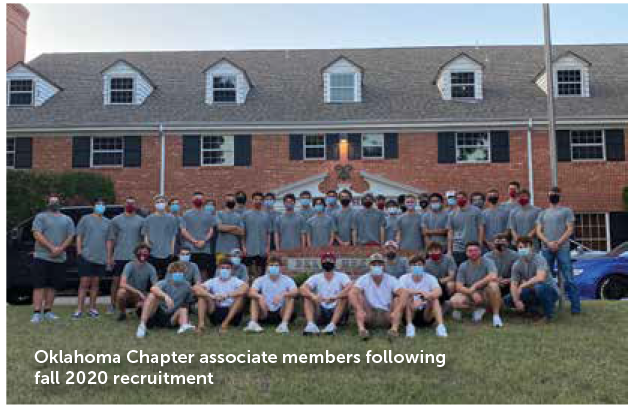
With the closing of campuses and local limitations on events and gathering numbers, chapter events, including Initiation, were put on hold or moved to a virtual format. In total, the Fraternity had 1,316 associate members for the 2019-2020 academic year. Of those men, 555 were initiated in the fall and 318 in spring prior to campus closures. Of the remaining associate members, 396 have been held over for fall 2020 Initiations, while the other 47 were initiated virtually in the spring.
In terms of philanthropy and service, chapters/colonies also turned to virtual opportunities to continue to do good in their communities. Through letter writing campaigns and social media challenges, groups were able to fundraise for the Global Service Initiative and other causes. The Indiana Chapter, for example, raised a record $28,600 for GSI, many of it coming in through efforts made during quarantine. Other chapters, like Lafayette and Alberta hosted virtual bike-a-thons to raise money for mental health and multiple sclerosis, respectively. The Michigan Chapter also raised money and shaved their heads via Zoom in the virtual edition of its annual fundraiser for the St. Baldrick’s Foundation.
Adjustments at the International Level
Despite DU’s International Headquarters building being closed starting March 16 due to guidelines from the city of Indianapolis, staff continued to work remotely throughout the spring and summer to provide ongoing chapter support. In fact, chapters saw increased communications with their staff liaisons through email, telephone, text message and video conference.
“Chapter servicing is an important part of our work at the International Headquarters,” Kirk said. “That work became even more important as our brothers were uprooted mid-term and forced to adapt to online learning and chapter operations, not to mention the other changes and insecurity that came from living in a pandemic. While the Fraternity was also adjusting, we wanted our brothers, officers, volunteers and parents to know DU was there to serve as a resource and source of stability as we navigated changes together.”
During the first few days and weeks of quarantine, Fraternity staff quickly put together resources and guidelines for chapters/colonies. This included recommendations on how to address housing, meetings, philanthropy events, recruitment, chapter finances and more. A special webpage dedicated to these resources was created at www.deltau.org/coronavirus.
Just as the pandemic canceled in-person gatherings on campus, it also brought the cancellation of DU’s summer educational programs—the May and June Global Service Initiative trips, June’s DU Emerging Leaders Experience and July’s Leadership Institute. When making the decision to cancel these events, the International Fraternity Board of Directors looked at several factors, including ability to travel safely, if social distancing would be possible and more. Each cancellation was made in the best interests of health and safety of participants, as well as to alleviate the financial strain of attendance for those who may have lost summer jobs.
Despite these program cancellations, the pandemic created a unique opportunity for the Fraternity to develop virtual education opportunities. On April 2, DU hosted its first virtual webinar of the spring for undergraduates and volunteers, which discussed how to build brotherhood virtually. Throughout April and May, seven total virtual programs were held with topics ranging from recruitment to academic excellence, the Fraternity’s Membership Outcomes Assessment and how to stay involved in DU after graduation. Programs picked up again in July with three special webinars as part of a Justice in July series. One webinar was held in August, and another four have been scheduled for September. These programs have all been archived and can be accessed on the DU website at www.deltau.org/program-library.
To supplement the webinar series, on social media, a “Delta University” video series was created for the Fraternity’s Instagram IGTV feed. These short videos (roughly 10-15 minutes each) feature a different DU who provides relevant tips and advice. Topics have included journaling and best practices for leading your chapter. The Fraternity’s blog was also revamped to include new sections for Member Development and Recruitment Tips. Since the end of April, a new recruitment blog has been published every other week to motivate chapters and provide recruitment advice, especially as chapters prepare to shift to full or partial virtual recruitment for the fall 2020 term.
“There has always been so much more to Delta Upsilon than the in-person, social parts of brotherhood,” said DU’s Senior Director of Educational Programs Noah Borton. “Our mission of Building Better Men should stop for nothing, not even a pandemic. It is important that we continue to show up—even if virtually—for one another to provide support and learn together.”
The online educational initiatives started this spring will continue to be a part of the Fraternity’s strategy moving forward. These online programs and multi-media resources will allow DU to have more educational touchpoints outside of in-person programs and reach even more brothers than ever before.
Financial Ramifications
Unsurprisingly, chapters/colonies, individual members and the International Fraternity have felt the financial impact of the pandemic.
At the chapter level, chapters/colonies have the responsibility of creating, adjusting and maintaining their budget each year. This includes determining what/if any refunds were due to members in the spring for items like canceled formals and other social events, as well as determining dues for the fall based on what chapter activities will be allowed to happen. House corporations had to consider housing refunds from spring, reduced occupancy during the summer and fall, and the uncertainty of housing in the new academic year.
At the International Fraternity level, the Fraternity Treasurer worked closely with staff and other Board members to carefully scenario plan for the 2020-2021 academic year. Twenty-eight percent of the Fraternity’s income comes from chapter and member dues. With so much uncertainty as we begin the fall semester, the Fraternity budgeted for significant decreases in recruitment numbers, average chapter size and the number of men initiated. To offset these projections, the International Fraternity was able to cut its operating budget by one-third for the year as decisions were made to reduce staff size, travel for in-person chapter visits, and more. Thanks to these measures, past planning and savings, the Fraternity will remain on solid footing in the year ahead.
On the Loss Prevention front, significant steps were taken to reduce the amount billed to chapters/colonies for the 2020-2021 year. Despite the International Fraternity seeing a 71 percent increase in insurance costs for the year (due to industry trends and other factors), on average, DU chapters/colonies will see a 9 percent decrease in their Loss Prevention billing. This decrease is the result of the Fraternity using reserves to cover costs, adjusting how many men chapter/colonies are assessed for, and more.
With many brothers and their families affected by layoffs, furloughs, and canceled jobs/internships, creating a membership experience that is both affordable and valuable will be more important than ever over the next few years. As such, the Fraternity will continue to scenario plan and make sound financial decisions. The Delta Upsilon Educational Foundation—coming off its most successful fundraising year in history—will also continue its efforts to raise funds to support the Fraternity, its programs and individual members.
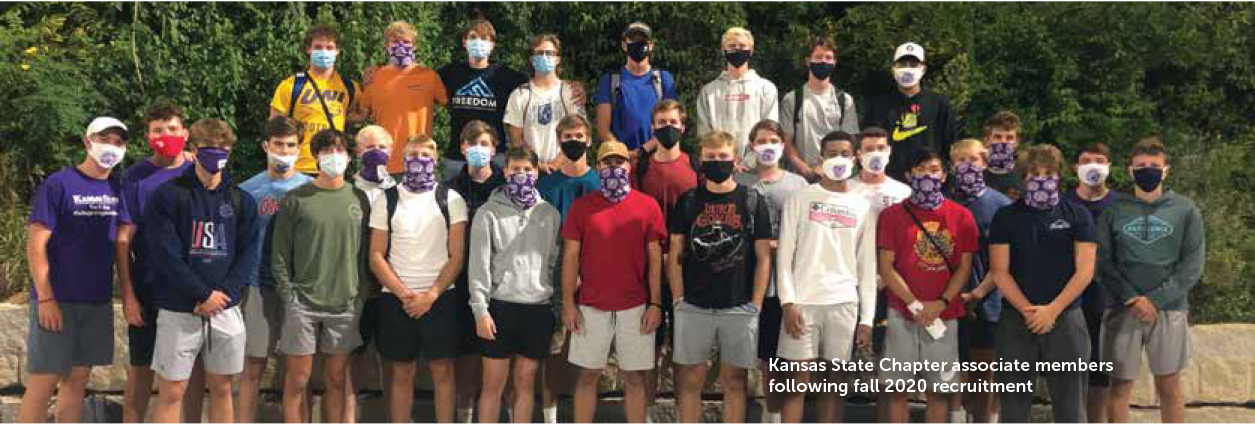
Looking to the Future
As the COVID-19 pandemic continues to evolve, it is clear there will be more short- and long-term effects on day-to-day life. As this issue of the DU Quarterly is published, many chapters/colonies are looking at continued online learning for the fall term, while others are back on campus with a series of new guidelines and precautions. To help chapters/colonies prepare, the Fraternity has created a decision tree and corresponding resources to help chapters determine how they should operate.
For chapters/colonies on campuses that have full remote learning for the fall, the DU experience will also transition to fully remote. As with the end of the spring, chapters/colonies will be asked to virtually conduct chapter meetings, educational programs, recruitment, the Associate Member Education Program, Initiation, philanthropy and service. The DU experience should not be paused as brothers will continue to need support and a source or normalcy.

For those returning to campus, chapters/colonies will experience a hybrid model of chapter operations. Due to restrictions on gathering sizes and events, these chapters/colonies will not be able to return to “business as usual.” Based on a number of factors such as chapter size and campus/local guidelines, chapters/colonies should determine what is best for them. For example, to limit gathering sizes, chapters should determine if multiple chapter meeting sessions should be held or if some brothers should attend in person while others stream the meeting online. Chapters/colonies should continue to work closely with their advisors, alumni volunteers and IHQ staff liaison to make and adjust plans as necessary.
For any chapter/colony returning to campus, it will be crucial to know, understand and follow all campus/local guidelines regarding COVID-19. As men of character and as good neighbors, it will be incumbent on everyone to follow any guideline that promotes the safety and well-being of others.
Chapter housing will also look different in the year ahead. Following guidelines and recommendations from the Center for Disease Control and Prevention (CDC) and other entities, DU’s local house corporations have been hard at work to ensure social distancing, sanitization and other measures to prevent the spread of the virus. In some cases, this means reducing the number of men living in the facility, reconfiguring room layouts, adjusting food service protocols, and limiting the number of guests allowed.
For more information about the Fraternity’s plans and recommendations for fall 2020 regarding COVID-19, visit www.deltau.org/coronavirus.
How Should My Chapter Operate This Fall?
Campus situations for the fall 2020 term will vary from chapter to chapter. It will be important for all chapters/colonies to follow their campus, local, state/province and federal guidelines.
We have identified the two most common scenarios a DU chapter/colony will face this fall. Use our decision tree to determine what type of chapter you are. Then visit www.deltau.org/coronavirus to find detailed recommendations for your chapter/colony. This includes recommendations regarding chapter meetings, recruitment, philanthropy and more. If your chapter/colony has a chapter facility, you can also visit www.deltau.org/housing-resources. If your campus situation changes, please work closely with your advisors, staff liaison and local house corporation (if applicable) to create a plan of action.
